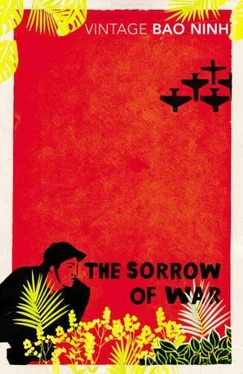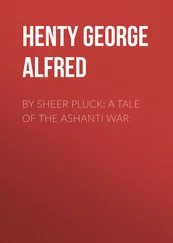Sinh’s parents had died. His brother had married and left. Sinh was left in the room at the end of the corridor on the first floor, a room dark and wet, with its only window facing the toilet. Kien pushed the door open and stepped in. Through the dim light he saw two children and a thin woman, Sinh’s sister-in-law, sitting on the floor assembling cartons for the local biscuit factory, earning a little extra money. None of them looked up.
‘How is he?’ asked Kien, whispering.
‘The same,’ the sister-in-law replied in a tired, bored voice. ‘Everyone who visits admires him for hanging on so long.’ She sighed.
The dying man lay on a bamboo bed in the far corner of the room. Kien approached and caught a whiff of an unbearably foul smell. The stench came from the filthy bedclothes.
Sinh’s hair had all fallen out, revealing a darkening scalp, dry as old timber. His nose had flattened, and his cheeks had collapsed, revealing his teeth and eye-sockets. Kien couldn’t guess if Sinh had his eyes open or closed. He leaned over and asked: ‘Do you recognise me, Sinh?’
‘He still recognises you,’ interrupted the sister-in-law, ‘but he can’t speak because his lungs have collapsed.’
‘Can he eat?’
‘Yes. But it just flows out the other end.’
Kien sat down on the stool by the bed, not knowing what to say. Sinh could move a little, but his desire to live was clearly gone. Fifteen minutes passed, then twenty. If he watched carefully Kien could discern a slight rising and falling of the blankets. The room was still. Now and then the sister-in-law mumbled something about how harshly fate had treated her. Sinh’s brother, sleeping in a loft above Sinh, suddenly began to snore.
Poor Sinh, the poet of Class 10A. What a great pity!
The summer before Kien had visited Sinh in hospital. He could still move then, but his will to live was dwindling. He would sit in his wheelchair and speak with a clear mind, ignoring the certainty of his fate, that he would soon die. He didn’t complain or bemoan his destiny. Above all he had never made his visitors feel uncomfortable.
Often, he would work up enthusiasm and act delighted, smiling all the time at his visitors. He would chat away in his weak voice, speaking of schooldays and classmates, the pretty girls and the teachers and other matters removed from his present state. He would act as though everything Kien told him was fascinating: ‘Right, excellent, how could I have forgotten!’ And: ‘Now I remember! How could I have forgotten that!’
Kien had pushed Sinh’s wheelchair out into the hospital’s pretty garden, past some mimosa shrubs in beautiful bloom. The afternoon had been so calm, the air so clean. The sunshine had slanted over the green lawn.
They stopped under the canopy of a spreading boddhi tree. ‘The sun divides the afternoon into halves,’ he had said, ‘and the mimosa petals close… see, that’s a poem,’ Sinh smiled. ‘I didn’t dare think of myself as a real poet when I joined the army,’ he said. ‘I hoped to be someone like Le Anh Xuan, our southern hero whose works will endure from this war into the next century. Well, that was my dream. And while I think of it, I must confess I wrote many romantic poems for Phuong and for ages I was frightened you’d find out and beat me up.’
There was nothing to say. The two childhood friends were now in completely different situations in post-war life. After so many years of fighting they were able to speak to each other wordlessly, using the language of their hearts.
Kien saw Sinh back to his ward and said goodbye. He hugged him and kissed his cold thin cheeks.
‘Come and see me, some time,’ Sinh called after Kien as he left.
‘Please,’ he had said, beginning to sob in a rare bout of self-pity. ‘Sometimes I wish I could kill myself and end everything quickly. War has robbed me of the liberty I deserve. Now, I’m a slave…’
And now, as he sat near the dying Sinh in his bedroom, Kien was choked with emotion. He buried his face in his hands, unable to bear it. He then got up and ran from the half-bedroom, half-mortuary, without even saying goodbye to the sister-in-law.
Back in his room, his muddy jacket and shoes still on, he lay on his bed and stared at the cracked and yellowing ceiling, his hands behind his head. Hot and painful tears silently ran down his cheeks.
What was to be done? What could be done? He coughed, wanting to moan out loud to ease the pain.
In truth he had been deliriously happy to return home to Hanoi when the war ended. He had spent more than three days travelling on the trans-Vietnam ‘Unification’ troop train after the fall of Saigon. It was a happy feeling and some soldiers now regarded it as the best days of their army life. Still, there had been some pain, even then.
The train was packed with wounded, demobilised soldiers. Knapsacks were jammed together on the luggage racks and in every corner. Hammocks were strung vertically and horizontally all over the compartments, making them look a little like resting stations in the jungle.
At the start, there had been a common emotion of bitterness. There had been no trumpets for the victorious soldiers, no drums, no music. That might have been tolerated, but not the disrespect shown them. The general population just didn’t care about them. Nor did their own authorities.
The railway station scenes were just like afternoon markets, chaotic and noisy.
The authorities checked the soldiers time after time, searching them for loot. Every pocket of their knapsacks had been searched as though the mountain of property that had been looted and hidden after the takeover of the South had been taken only by soldiers.
At every station the loudspeakers blared, blasting the ears of the wounded, the sick, the blind, the mutilated, the white-eyed, grey-lipped malarial troops. Into their ears poured an endless stream of the most ironic of teachings, urging them to ignore the spirit of reconciliation, to beware of the ‘bullets’ coated with sugar, to ignore the warmth and passions among the remnants of this fallen, luxurious society of the South. And especially to guard against the idea of the South having fought valiantly or been meritorious in any way.
But we ‘meritorious’ and victorious soldiers knew how to defend ourselves against this barrage of nonsense. We made fun of the loudspeakers’ admonishments, turning their speeches into jokes, ridiculing them.
By the time we reached the northern Red River Delta areas, where the roads were running alongside us showing the way home to Hanoi, we were all deliriously happy. All the dreams and wishes that had so long been pent up inside suddenly burst from us.
Even the most conservative among us expressed wildly passionate ideas of how they would launch into their new civilian, peacetime lives.
Kien had befriended Hien, a girl soldier from Zone 9 battlefield in the south. She had travelled south in 1966 and been badly wounded in battle. Although her native home was Nam Dinh she had a Ha Tien provincial accent. At night, Kien had carried her to his hammock and they had spent the night together. The rocking of the train set the hammock swinging and despite the cheerful teasing from the soldiers around them they had hugged each other and slept together, awakened together, dreamed together and hugged some more. They had kissed hurriedly, sharing the last moments of their uniformed lives, the last kilometres of their battlefield of youth, in passionate embrace.
When the train stopped at her station, Kien helped Hien down from the train. He told her he wanted to leave the train there and take her home, but she had laughed and refused.
‘That’s enough. Let our stories become ashes now,’ she had said. ‘You need to get home, too. Go home as quickly as possible and take care of your house. See if there’s anyone or anything left for you to live for. Maybe someone’s expecting you.’
Читать дальше












